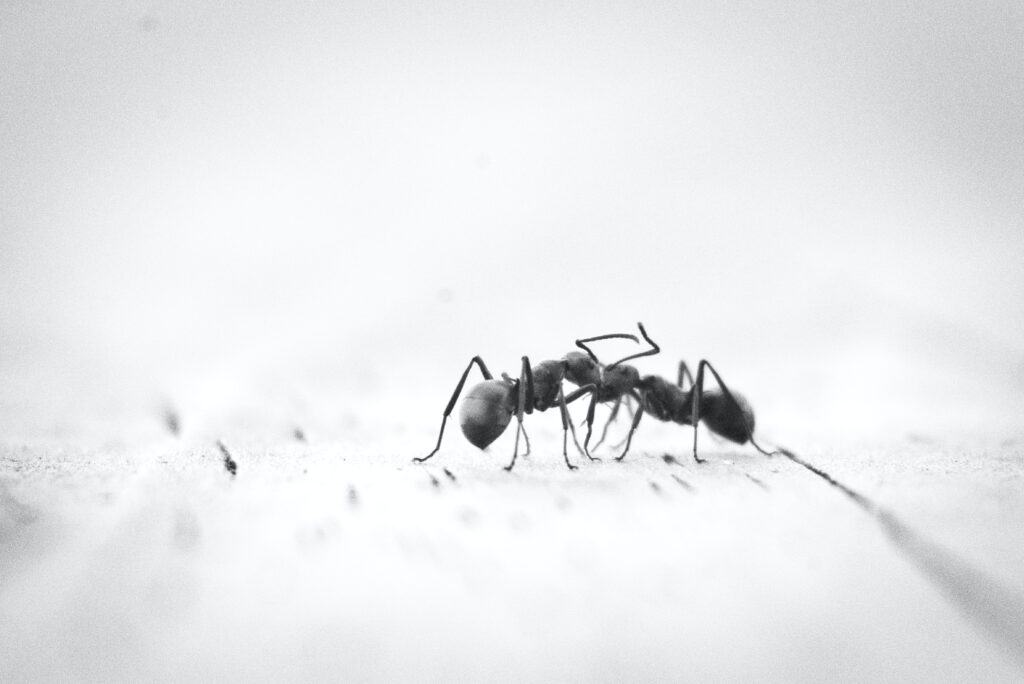Hibernation is a resting state that many different animals routinely go into.
These animals go into this state allows them to have a more fruitful spring, as they have restored energy during the winter.
Not all animals hibernate.
For example, humans do not hibernate during winter.
We answer this critical question and more do dive deeper into why ants hibernate, and what these cold-blooded insects do during the cold weather.
Do Ants Hibernate?
Ants will hibernate during the winter months, as they detect a temperature drop in their environment. Once the weather drops below 60°F (15°C), ants will start burrowing away to rest through the winter. This usually takes a couple of months and starts in the late months of the year.
When Do Ants Come Out of Hibernation
Ants coming out of hibernation depends on rising temperatures. It takes upward of three to four months for the ants to come out from hibernating. In other words, Until the temperature rises between 75 and 95 F ( 24 – 35 C).
Ant Keeping and Hibernation
Since your ants will be in a formicarium, your ants will awaken once your home heats up.
If you maintain the same temperature in your home all year long, you will probably have cooled down your formicarium at some point to get the ants to hibernate.
Bring the ants to back up to room temperature and allow them to start working again.
It is a fascinating topic about ant keeping and hibernation, especially when you consider that this hibernation period could act as a “break” for you during your ant-keeping journey.
Out in nature, ants hibernate under things like fallen tree bark and deep in the soil.
These ants prepare for the colder winter months by eating extra food. Ants are cold-blooded so they can detect the winter months coming with their changing body temperature.
More information about Ant Keeping and Hibernation is below.
Not interested in hibernation? That’s okay, we have a full beginner’s guide here at this article:
Ants are everywhere.
You may have seen them running around your household, bulging out of the grass, or even making their way into your house by marching together after something sugary.
These ants seek a cool habitat or some food throughout the warm summer seasons.
But, do you know what ants do in the winter when the temperature is not warm enough?
Before we jump into this, we must look at why animals hibernate in the first place.
In the cold season, we humans put many layers of clothes on to combat the freezing temperatures.
We also put on a fire to warm ourselves and find comfort, but what do the ants do when it gets cold outside?
As we all know, ants are intelligent, hardworking, and community-based insects with incredible strength.
These characteristics make it easy for them to form a strong, cohesive community since all the ants will contribute to the success of the nest.
Ants are great at working together and collecting materials for their survival.
Yet, ants cannot solve every problem, and they struggle to deal with winter.
With snow falling on the ground, potential food resources depleting, and strong weather conditions, the ants don’t have a great chance to find food to restore the energy expended.
For these reasons, the ants will burrow down in their nests and disappear during the cold season.

But are they always prepared?
Do they always survive the intense conditions?
Where do they hide, and how can they survive without getting out of their habitats to collect food?
If Ants cannot resist the cold of the winter, are they able to withstand other intense weather conditions?
More information on all these topics is covered below.
Why Do They Hibernate?
Everyone assumes that all animals hibernate at the same time.
This is not always true.
Hibernation is much less a timing thing and more of a temperature thing.
Ants do not have a calendar and do not hibernate at directly specific times of the year. They go in a state of latency inside their colonies after the temperature drops a couple of degrees.
This makes sense, as they do not care if it’s November or December, and what ants care about is if they can find resources to bring back to the colony. A drop in temperature is a direct indicator that this won’t be possible.
Ants are cold-blooded insects?
This is a crucial thing to know.
Ants can survive without food, but it would be impossible to go through the entire winter without warmth and proper shelter.
This is why you don’t see ants running around during certain parts of the year.
Hibernation leads to an increase in an ant’s lifespan.
During mild or warmer winters, ants can continue their regular activities.
This is the opposite of how they behave while in true hibernation.
Ants do not entirely disappear or stop functioning like usual. It’s important to note that most ant species are reluctant to risk their lives being in plain and cold sight.
Hence, they are invisible, as they avoid crossing your path searching for food materials.
Ants focus on their current location for the hibernation period as their home space provides them with warm and safest scenes.
This aids in protecting and ensuring the future of the colony.
One of the key strategies of ants is to stay out of sight.
Ants have evolved to find their way through various weather conditions. They do this by staying out of vision paths and mostly sticking to the darkness.

How Do Ants Survive Winter?
The answer would be the late-winter months.
In both plants and animals, Hibernation is a state of being inactive. They do this to conserve strength and maintain warmth and energy to battle against the severe weather. Usually, this happens in the winter months.
Ants are active insects, but you usually only see them during the summer, autumn, and spring. During this time, they are gathering eating materials and building colonies.
Once hibernation, they remain in this state for about 3-4 months of the cold frigid winter.
While ants are active on warmer days, they prepare their nests, which eat up a lot of energy in summer through autumn.
Near the end of autumn, the ants will eat more food, and this is so they can build up some fat that will provide warmth during hibernation.
You can manipulate the hibernation process of your nest due to hibernation being a temperature-controlled event.
This process is not recommended and could result in creating a fragile colony.
When Do Ants Go Into Hibernation?
Not all ant species need hibernation after their first year, which means that hibernation is optional for most new ant colonies.
Some species include Camponotus, Formica and Myrmica.
During this period, fewer or weakened forms of worker ants will be created.
Each ant colony shows some obvious signs when they are about to hibernate.
Some will be general traits, but others can reveal some out-of-the-box characteristics. The ants will have swollen gasters (full of collected foods) and gradually slow down their everyday activities.
This includes their scavenging and seeking behaviors. Genus-specific signs are more helpful in giving away signs of their hibernation period.
Another key indicator is that the population will start to dwindle. A population seen as increasing will begin to taper off or decrease.
If this is happening, maybe your ants do need a hibernation period.

Hibernating Ants
You won’t have to feed your ants in the hibernation period.
Yet, they require enough water to last them through the dry season.
Do not let your ants die because you forget to give them water, even in the winter ants still need a good supply of hydration.
Unless you have set up a test tube-like system of supplying water directly into their colony, you must hydrate the formicarium, and this requires you to check up on the ants daily.
Never assume that your formicarium is hydrated.
You should constantly be checking your formicarium.
Advantages of Hibernation for Ants
An ant colony still slows down, despite not being in a hibernation period.
Remember, ant keepers, do want their colonies to hibernate.
Most ant keepers let their ants hibernate in the first year because it sets the tone for their colony’s survival.
If the Queen ant does not hibernate, her life span will be reduced.
Hibernation allows a colony to recuperate and prepare for the upcoming year.
Many new ant keepers do not want their territories to hibernate.
This will lead to long-term problems with your colony.
Pro Tip: Ants live longer if they have a hibernation period once the temperature drops.
Should you move your colony out of the test tube into a formicarium?
This depends on the number of ants that you have within your colony. If you already have your ants in a formicarium, you can leave them in there.
Make sure the space will be enough to sustain the colony through the hibernation period. An overcrowded formicarium can be a problem.
If your colony is not big, you can usually put them in a test tube, but this isn’t recommended.
Do all ants hibernate?
Not all ants hibernate, some ants like dark rover ants, carpenter ants, odorous ants and crazy ants don’t specifically need to hibernate, but still, find it advantageous to do so.
Winter ants for example thrive during winter.
They wait for the temperature to drop to emerge from their ant nest located in deep soil.
They take advantage of the low competition while other ants hibernate and flourish.
Many people experience an ant infestation during this time, and call pest control hoping to help control and kill ants. If you’re experiencing an ant infestation during this time, it’s probably the winter ant.
Do Ants Hibernate in Winter?
Your ants will not die in the winter, and this hibernation period is critical for your success as an ant-keeper.
It takes a lot of hard work and dedication to raising a colony of ants.
But with proper research and care, anyone can have ants as their pets.
Ant keeping can be a lot of fun. With proper tactics and a bit of hard work, you can create a successful nest.
In this article, we’ve discussed ant hibernation, the period of hibernation, and other topics.
Happy Keeping!
